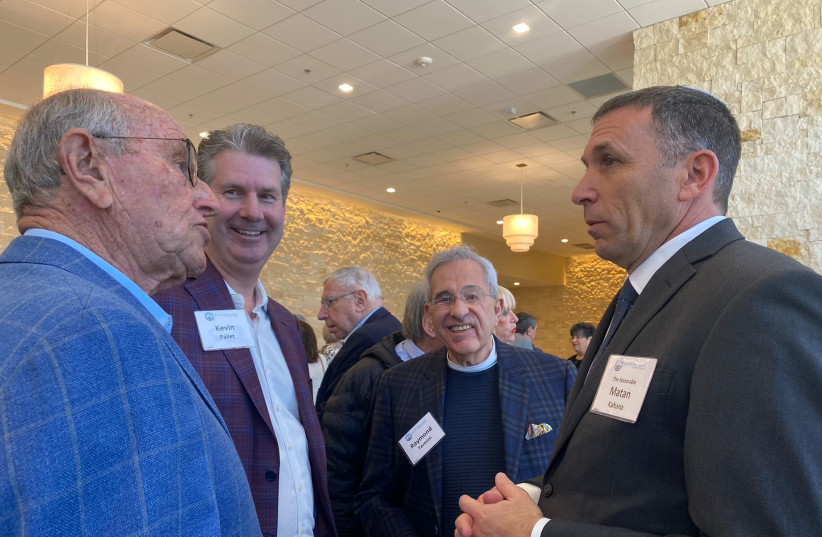Leading Modern Orthodox American rabbis signed a letter criticizing Religious Services Minister Matan Kahana over his conversion reforms after meeting with him in the US last week.
“This week, as leaders of America’s largest Orthodox and Zionist organizations, we met with Israel’s minister of religious affairs, Matan Kahana, to discuss his proposed reforms of the process of conversion,” they wrote. “It was a productive and valuable meeting, as the issues that he is trying to address are significant. We listened, we shared our concerns, we engaged in conversation, but ultimately we left the meeting unable to support his legislation as presently written.”
The letter was signed by Rabbinical Council of America President Rabbi Binyamin Blau; executive Vice President Rabbi Mark Dratch; Religious Zionists of America Co-President Rabbi Leonard Matanky; Rabbi Michael Taubes, a rosh yeshiva at RIETS-Yeshiva University; Orthodox Union President Moishe Bane; and OU Vice President Rabbi Moshe Hauer.
Kahana flew to the US in an effort to convince the Orthodox Jewish leaders to support his kashrut and conversion reforms.
“There is a deep connection between Israeli citizens and Diaspora Jewry,” he said before embarking on his journey. “The actions of each of the parties have mutual effects on the other. After many months of intense work on the Conversion Law, I will travel to meet directly with the American Jewish communities to explain the principles of the law and its necessity for the future of the State of Israel and world Jewry. The Conversion Law is a historic law that allows the State of Israel to face one of the significant challenges it faces. Diaspora Jewry must be connected to this move.”

Kahana’s staff has asked for a meeting with the RCA and the OU ahead of the minister’s visit to the US. But according to sources in Kahana’s office, representatives of the OU offered to create a larger meeting with more Modern Orthodox organizations such as the Mizrachi World Movement and Beth Din of America. Kahana’s representative was told that the organizations were all happy to meet with him, but asked him to dedicate an hour-and-a-half in order to give enough time for all sides to speak and be heard.
“They gave Minister Kahana lots of respect,” said a source who participated in the meeting.
According to sources close to Kahana, his advisers “stressed not to photograph the meeting and not to publish any content that was said publicly. They said they have ‘a lot of sensitivities.’ That was acceptable to us. We agreed that we would issue a joint statement with the approval of both parties after the meeting,” said a source close to the minister.
THE MEETING took place last week in New York, attended by approximately 10 rabbis and the minister with his staff, including his chief of staff Yochai Revivo and Dr. Shuki Friedman from the Jewish Peoplehood Policy Institute.
“It was a really good meeting,” said one of the participants. “The minister presented his side of the reform and the rabbis stressed that they have difficulty with the reform, which will enable every chief rabbi of a city in Israel to convert” people to Judaism.
They explained that it would put them in a difficult situation since everyone would want to disperse the conversion process in the US, instead of unifying the organizations, as takes place today.
The Chief Rabbinate has in past years looked upon the RCA as being the official organization that is the address on the issue of conversion in the US.
“They have the recognition of Chief Rabbi Lau and they do not want to lose it,” said a source close to Kahana.
One of Kahana’s advisers said that his staff had “met Modern Orthodox rabbis who are not affiliated with these organizations, who say the RCA does not recognize their conversions. There was a certain stage where the minister said that this was the first time he had heard this claim and that it was a legitimate claim.”
There was no discourse on the pros or cons of the conversion reform.
“The rabbis said to the minister that they know he means to do good, but at no point did they say they oppose it outright.”
The rabbis said that they wanted to continue the conversation, according to a participant.
“If you are serious, we will continue the conversation,” they told Kahana. “They said they were under pressure from the office of the chief rabbi,” the source close to the minister said, and that “we don’t want to ruin the relationship we have with the chief rabbi.”
The OU’s Hauer said, “We still welcome dialogue with the minister. We wrote the letter not as an attack, but as a policy disagreement and a concern about the law as written. We think there needs to be changes. We clearly think it cannot be the way it currently is. The current proposal is not the solution.”
According to another rabbi who participated in the meeting, “We didn’t want to attack him personally. When we were asked for a quote for their press release, they wanted us to say that we agree with the reform – but we couldn’t do so.”
The representatives of the rabbinical organizations felt they “needed” to send out this statement since “there was a headline in the Israeli media based on quoting three rabbis claiming that ‘the Orthodox Jewish community in North America supports the law’ – but they do not represent American rabbis. We said we cannot support it at the moment, but the door is open for dialogue.”
